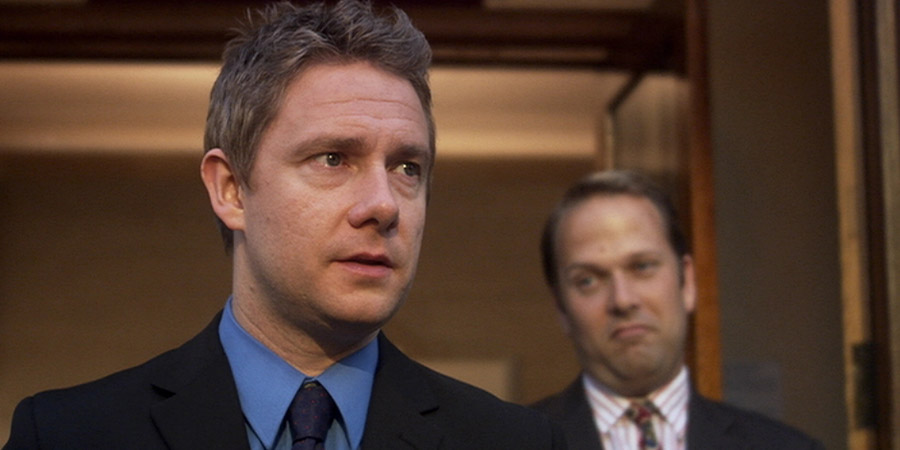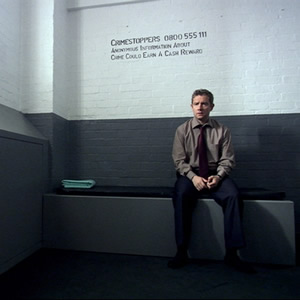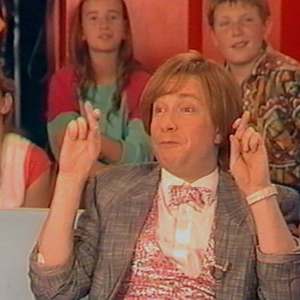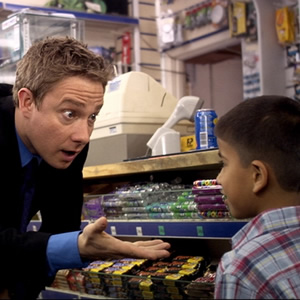Robert Leedham interview

Robert Leedham kindly took some time out from script editing to explain more about what his job entails and to talk to British Comedy Guide about Other People, Company Pictures' comedy pilot...

Hi Robert, thanks for talking to us. Perhaps you could begin by explaining what it is you do in the role of a script editor?
The role of script editor is half best friend, half slave-driver, and half Pick 'n' Mix counter at Woolworths. (You don't have to be any good at maths.)
You are the writer's best friend, because you need to offer them advice and support at every stage of the script development process. You need to be brutally honest with them about what's not working and what's not funny in the script. You need to be sensitive to the unique, beautiful thing they're trying to achieve, and to help them get there.
You are a slave-driver on behalf of the producer, because you need to keep dragging new drafts and new scenes and funnier lines out of the writer. You need to keep pushing the writer with the hateful words, "Is that as good as it possibly can be?" And you need to cajole the writer into doing things that the producer thinks will improve the show.
You are a Pick 'n' Mix counter at Woolworths because you need to keep coming up with an endless stream of ideas and provocations and suggestions that the writer can rummage around in to find something that works. Most often, it's not what you suggest, but the suggestion sparks off a thought in the writer's brain about how to do things differently.
What are the main things you're looking to alter when going over a script?
There's no rulebook or set of standard changes. Each script has its own unique needs. Improvements can be massive changes or the tiniest of tweaks, or anywhere in between. Sometimes a script will suddenly work much better if you cut one of the characters completely, or even combine two characters into one. Sometimes a line of dialogue will be much funnier or stronger if you re-arrange the words within it, or change the punctuation. Basically, you try to defend what's good and truthful and unique about the script - and chuck out the rest.
What was it like to script edit Other People, Channel 4's Comedy Showcase sitcom pilot?
It's like being Courtney Cox in that Bruce Springsteen video, pulled up on stage. Or to use a slightly more macho analogy, it's like turning up at Wembley to support England, and Steve McLaren chucks you the number 9 shirt and says, "Rooney's injured, we'll find you some boots - you're on!"

Basically you're getting to work with people at the very top of their game. Toby Whithouse is a brilliant, extraordinary and very funny writer. But best of all, he's also very open to discussion and suggestions. Emma Burge is a sensitive, vastly experienced producer who is tough but knows how to keep things light. And Will Sinclair, the director, is a young director with a great eye who can do comedy and is definitely going places.
Also, the great unsung hero was the director of photography, Tony Slater-Ling, who is an out-and-out genius. And that's before you even get to the sublime Martin Freeman and the rest of the cast.
If all that sounds like wank, then sorry, but it also happens to be true.
Did the script change much from the first draft?
No, and yes. Toby has had the concept, characters and overall structure nailed from the very first draft. We book-end the show with flashbacks to the Martin Freeman character's early life, and they deliver a real emotional payload as well as laughs, so we've tinkered very little with the big stuff.
But every scene has been pushed to extract the maximum amount of comedy from it. And then there are the happy accidents. When Phil Davis was cast as the police sergeant, Toby wrote extra lines for him because he's such a god - and now they're many people's favourite moments.
And the jaw-dropping scene in the newsagents all came about when Rebecca Grant came in to audition and told us she could do a bit magic herself...
Do you think there is scope for Other People to be made into a full series?
Definitely. And it's not just me who thinks so. Both the Radio Times and the Guardian Guide said so in their very flattering reviews.
How different is it editing a comedy script like Other People, compared to a drama like Murphy's Law?
That's a good question. To my mind, it's not that different. In both cases, you're trying to provoke emotion and to create compelling characters that live in a world that's true to itself.
On Murphy's I was part of the creative team that turned the character from a cheeky chappy in his 'disguise of the week' to something harder, darker and much more authentic, so on both shows there's been a strong, singular creative vision. That makes everything so much easier!

Do you have any script-related advice you can give the budding comedy writers who read our website? What would you say is the most common 'problem' with scripts that you come across?
I read several potential sitcom scripts every week, and without doubt I can say that the most common mistake made by inexperienced writers is to start somewhere else other than character.
People don't watch sitcoms for concepts or for a stream of contextless gags. People tune in for characters they enjoy spending time with. (That doesn't mean they have to be 'likable', because it's self-evident that many of the greatest comedy characters are deeply flawed human beings, if not monsters.)
The successful sitcoms are the ones where all the characters are strongly defined and differentiated, and they all behave in their own individual and distinctive way, all the time. Characters in beginners' sitcoms will often do or say anything to get a laugh.
Really great advice there, thanks Robert! Something we ask everyone we interview is: excluding your own, what are your favourite comedies?
Of the recent crop, I really rate Outnumbered, Saxondale, The IT Crowd, Green Wing and I really liked Pulling on BBC3.
Like everyone else, I adore Father Ted, The Office, and Alan Partridge. From the Yanks, there's Cheers, Curb, Larry Sanders, M*A*S*H, and Will & Grace. I used to love Seinfeld, but somehow it's dated really badly.
Old-school classics that remain unutterably brilliant include Porridge, Dad's Army, The Good Life, and To The Manor Born.
But will there ever be anything to rival the decade of sustained brilliance of Frasier?
Finally, what's next on your script editing list Robert?
I work full-time for Company Pictures, so I'm lucky enough to be working on a whole raft of really exciting projects, but perhaps the biggest of the lot will be Generation Kill, an astounding Iraq War drama for HBO, written by the creators of The Wire.

